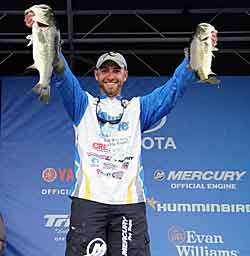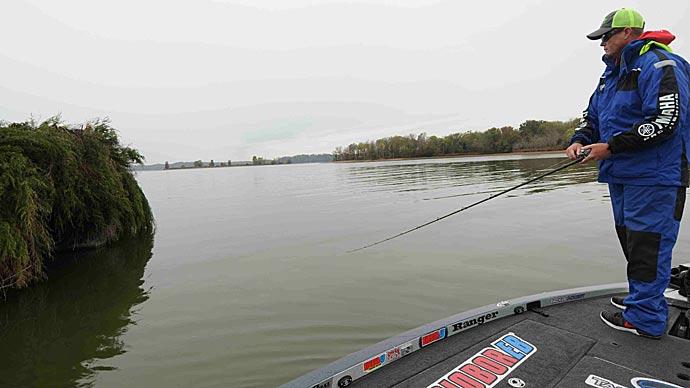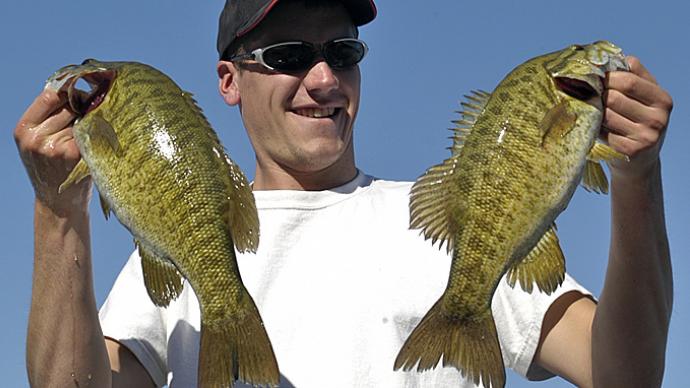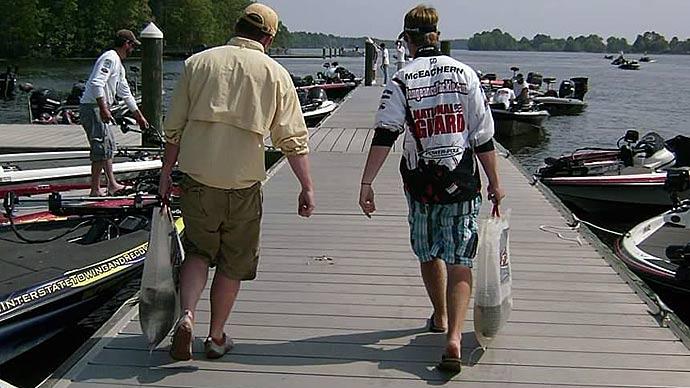
The formalities are over. You are sitting in your partner's boat at dawn, anxiously waiting to hear your boat number over the loudspeaker. There it is. He puts the pedal to the floor, and you begin racing down the lake at face-rippling speeds, headed for the mother lode of fishing holes.
You're not exactly sure what to expect. You just know that you want to make that first cast. Adrenaline is flowing. Expectations are high. You imagine yourself walking onto the weigh-in stage, holding a sack full of fish. You can picture yourself holding the winner's trophy high over your head and accepting that big poster-sized check! This is going to be good. Next thing you know, you're ducking scads of branches as your boater navigates his way down a narrow slough, barely wide enough for the boat. Your high hopes seem dashed, and it's starting to feel like it will be one of those days.
Welcome to life in the backseat. It's not always what you expect or what you like. Sometimes it's better than you can imagine! Whatever you encounter, each tournament provides an eight-hour day for you to make the most of. Take the situation above, for example. The boater could be tossing a spinnerbait or small crankbait down the center of that slough up ahead of the boat or picking apart every good-looking target with a jig. He may even be catching some fish. Doing the same thing behind the boat might be uncomfortable and unproductive, especially if the trolling motor is kicking up crud and muddying the water. You can drop your jig into the same likely places, hoping to find something that the seine up front left behind. Or, you can watch his efficiency and hope to capitalize on a missed flip or an untapped spot in the cover. If that doesn't seem to be working and it just so happens that the channel is deep enough that the water isn't being muddied, you can try casting a crankbait behind the boat, dragging a Carolina rig, or swimming a worm. The key is to be alert, attentive, and cognizant of your opportunities. The more versed you are in patterns, lures, and presentations, the more opportunities you will recognize, even in the worst situations. One thing is for sure. For better or worse, each trip will be a learning experience.
It would have been nice if the boater let you know ahead of time that his first spot would be a tight fit and that your casting opportunities would be limited. Knowing what to expect would have better prepared you. For example, you might have learned that a fishable tactic would be to flip or pitch a jig to shoreline cover as he quickly covered water with his spinnerbait or crankbait. While you shouldn't always expect such niceties, you will often be pleasantly surprised.
I experienced this situation in an FLW championship event on Lake Sinclair. Once we were in a narrow creek, and I realized what was going on, I tied on a jig and pitched it to shoreline cover, but the boat was moving at a fast pace, and it was nearly impossible to work the jig properly as the cover whizzed by. The boater was doing what had worked for him in practice, and it was my job to make the most of the situation. It just so happened that I got the bites, sometimes in rapid succession. Nevertheless, our tactic remained unchanged until we left to go Carolina rig some points. As it turned out, a couple of the better weights for the day came out of that same little creek, using, guess what ... a jig!
Before you get to the first spot, try to find out what to expect from your partner. Ask questions once you are in the boat, waiting for take off. If you need to, tie on the appropriate baits then. Once fishing begins, however, nothing says you must use the same bait in the same color as your boater. You may have gotten some good warm and fuzzies from tales of his pre-fishing exploits, but don't assume anything. Until a definite pattern is determined, stick with your strengths and instincts. Maybe your first choice of lures or presentations in similar situations on your home water would be better. You may end up teaching your partner a thing or two.
It's a funny sport. Strange things tend to happen. Factors such as boat position, speed, and casting angles often determine the tactics that will be most efficient or practical at any given time. Don't force something that isn't there. Often, fast-retrieved baits such as rattletraps and buzzbaits arouse a bass' senses more than trigger a strike. Just as often, a well-chosen "follow-up" bait can draw the strike. If the place looks good and he says that he has caught fish there, but his fast retrieves aren't working, either slow down your presentations or use a good "follow-up" bait, such as a hard- or soft-plastic jerkbait, swimming worm, topwater lure, grub or spinnerbait behind his buzzbait. It sounds cliche, but let the fish determine what you do.
Never be embarrassed to ask questions. Being a co-angler is a great time to absorb much information from some pretty darn good fishermen. Of course, most anglers are willing to share information that can make your day more productive and make you a better angler in the future, but it may be up to you to ask. Of course, being observant and paying as much attention to detail as possible is your best bet.
Don't expect everyone to give away all of their secrets. Likewise, use common sense and good judgment when asking your partner questions. For instance, talking about how or where he fishes another lake is not in the best of taste as it has nothing to do with your task at hand and may distract him from what he is trying to accomplish at that moment.
Besides learning as much as possible, your goal should also be to earn a good reputation as a respectful, trustworthy person. As I mentioned before, this alone will pay huge dividends. Someday, you may find yourself in the driver's seat, looking to hang on to some small advantages of your own. For now, as a co-angler, you can return to other tournaments armed with great new tactics and information. Over time you may surpass the abilities of competitors who are unwilling (or unable) to put forth the time, money, and energy you expend as a co-angler in this environment.
Content provided by Bass Fishing Magazine, the official publication of FLW Outdoors




